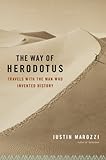History, particularly ancient history, isn’t an American strong suit. In fact, I wouldn’t be surprised if watching 300, a retelling of the Battle of Thermopylae in 486 BC, is perhaps the lengthiest encounter much of that movie’s audience has had with Greek history. It’s an even safer bet that far fewer were aware that a line in the movie, a Spartan commenting that if the Persian arrows blocked out the sun they would at least be fighting in the shade, actually comes from some ancient Greek dude named Herodotus.
 As a result, it should come as no surprise that a droll and enlightening look at Herodotus comes from a British writer. With The Way of Herodotus: Travels with the Man Who Invented History, Justin Marozzi uses his skills as a travel and history writer to introduce us to the fifth century BC Greek known as the West’s “Father of History”. More important, Marozzi does so using the prism of today.
As a result, it should come as no surprise that a droll and enlightening look at Herodotus comes from a British writer. With The Way of Herodotus: Travels with the Man Who Invented History, Justin Marozzi uses his skills as a travel and history writer to introduce us to the fifth century BC Greek known as the West’s “Father of History”. More important, Marozzi does so using the prism of today.
Herodotus becomes Marozzi’s companion and guide as he travels to Turkey, Iraq, Egypt and Greece to follow in the steps of the man who helped document the birth of Western Civilization (with caps, of course) and a clash of cultures that still exists. To call Marozzi a Herodotean is an understatement. He is unquestionably passionate about not only Herodotus’ role in history, but his writing style and the approach to and breadth of his multi-volume history of the wars between Greece and Persia. In addition to being the world’s first historian, Marozzi writes in his introduction,
he is also its first foreign correspondent, investigative journalist, anthropologist and travel writer. He is an aspiring geographer, a budding moralist, a skilful dramatist, a high-spirited explorer and an inveterate storyteller. He is part learned scholar, part tabloid hack, but always broad-minded, humorous and generous-hearted, which is why he’s so much fun.
Marozzi seeks to prove these points with both a sense of adventure and a waggish touch, relying most heavily on his skills as a travel writer. This is as much a travel book as a history book and enjoyable in that sense alone. To Marozzi, the land and the people are an integral part of his pursuit of Herodotus, just as they were important to Herodotus. Marozzi is observant to detail and uses The Histories as not only a source of information but a tool to compare, contrast and entertain. Like Herodotus, he is not afraid to embark on tangents and digressions, particularly if he thinks they help make for good storytelling. He isn’t always successful in that regard.
Yet The Way of Herodotus may be most compelling as it explores just how little we may have changed in the last 2500 years and at least one effort to bring about change.
In the very first sentence of The Histories, Herodotus sets out his purposes, which include “especially to show why the two peoples fought each other.” Those “two peoples” were the Greeks — the West — and the Persians — the East. As Marozzi points out, while Herodotus was writing during the Peloponnesian Wars as they overshadowed the world, beginning in 2003 the war in Iraq “was doing the same thing.” It also presented “cultural confrontation and the clash of civilisations, democracy versus dictatorship, West versus East, religion, greed, hubris and its consequences.” All in all, it had “an unmistakably Herodotean echo.”
Marozzi gains firsthand experience with those echoes as he travels to post-Saddam Baghdad to help a British security company set up a civil affairs program. Yet his main goal and attraction is not Baghdad but Babylon, the site of civilizations that predated Herodotus by some 1,300 years but which even he could not resist.
One unmistakable subtext of The Way of Herodotus is that ancient history is not necessarily irrelevant in today’s world. Ethnic and geographic animosity still exist even if, like Iraq, it is cloaked in different purposes and reasons. Showing the potential for change, though, is an effort in an area where ethic enmity has been a constant for some time — the Balkans. Marozzi visits the head of a project that is trying to create a less ethnocentric and more balanced approach to history that more openly explores the differences and conflicts between and among peoples. With multinational involvement, the Greece-based Joint History Project created four new secondary school history workbooks that provide multiple perspectives on issues that have divided the Balkans. It is a long-term effort to make history a mechanism for critical thought rather than a nationalistic tool that may encourage ethnic hatred.
For the travel enthusiast and even the casual fan of history, the views of culture, society and history The Way of Herodotus provides outweigh the various diversions that tend not to lead much of anywhere. Additionally, given Marozzi’s praise for Herodotus’ storytelling, his writing style makes this an entertaining exploration of a long-dead Greek and the role of history in contemporary life and conflicts. Sadly, though, 300 will probably remain the main source of most Americans’ exposure to Herodotus.
As a species, we are inordinately vain. History is our mirror.
Justin Marozzi, The Way of Herodotus







